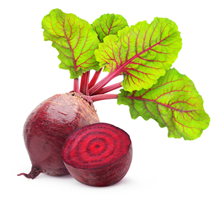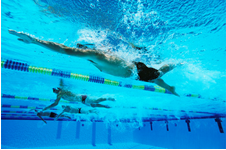Should You Add Beetroot Juice To Your Training Diet?
Author: Dr. Stephen Chaney
 When I saw the headline “Beetroot Juice May Boost Aerobic Fitness For Swimmers” I did a double take. Could something as simple as eating more beets actually improve exercise performance? Are there real health benefits of beetroot juice for athletes? So I looked up recent papers on the topic. But, before I review those I should give you a little science behind the idea that beetroot juice might affect performance.
When I saw the headline “Beetroot Juice May Boost Aerobic Fitness For Swimmers” I did a double take. Could something as simple as eating more beets actually improve exercise performance? Are there real health benefits of beetroot juice for athletes? So I looked up recent papers on the topic. But, before I review those I should give you a little science behind the idea that beetroot juice might affect performance.
The Science Behind Beetroot Juice And Exercise
Nitric oxide is a colorless, odorless gas that serves as an important signaling molecule in the human body. Among its many beneficial effects is increased blood flow to muscle. This increased blood flow appears to be preferentially distributed to the type 2 muscle fibers which support moderate to high intensity exercise. Thus, nutrients that enhance nitric oxide levels might be expected to improve moderate to high intensity exercise.
There are two naturally occurring pathways for producing nitric oxide in the body. The first pathway utilizes arginine, an amino acid found in dietary protein. The second pathway utilizes nitrates, which are found in fruits and vegetables. The best dietary sources of nitrates are beetroot, spinach and other leafy green vegetables.
Arginine has been widely used in sports supplements for some time to enhance performance. However, clinical studies on arginine have been mixed, with some showing small enhancements in performance and others showing no significant effect. Most experts now think that the benefits of arginine are primarily seen with untrained or moderately trained athletes (people like you and me) – not for highly trained or elite athletes.
It is logical that natural sources of nitrates, such as beetroot juice, would have a similar beneficial effect on exercise, but it is only in the last couple of years that scientists have started to evaluate that possibility. I looked up six recent publications for this review.
Does Beetroot Juice Improve Exercise Performance?
Study # 1: In this study (Bailey et al, J. Appl. Physiol., 107: 1144-1155, 2009) untrained men (aged 19-38) were given beetroot juice or a placebo for 6 days and then put through a series moderate-intensity and severe-intensity step exercise tests on days 4-6. The amount of oxygen required to support the moderate intensity exercise was decreased by 19% in the beetroot juice group. For severe intensity exercise, the amount of oxygen needed to support the exercise was decreased by 23% and the time to exhaustion was increased by 16% in the beetroot juice group. Those effects were statistically significant.
Study # 2: In this study (Kelly et al, Am. J. Physiol. Regul. Integr. Comp. Physiol., 304: R73-83, 2013) untrained older adults (aged 60-70) were given beetroot juice or a placebo for 3 days and then put through a treadmill exercise test. Resting blood pressure and oxygen uptake kinetics during exercise were significantly improved in the beetroot group.
Study # 3: In this study (Breese et al, Am. J. Physiol. Regul. Integr. Comp. Physiol., 305: R1441-14505, 2013) physically active subjects were given beetroot juice or a placebo for 6 days and then put through a double step exercise protocol involving a transition from stationary to moderate intensity exercise followed immediately by a transition from moderate intensity to severe intensity exercise. No significant differences were observed between the beetroot juice group and the placebo group during the transition from stationary to moderate intensity exercise. However, for the transition from moderate intensity to high intensity exercise both efficiency of oxygen utilization and endurance were increased by 22% in the beetroot juice group.
Study # 4: In this study (Pinna et al, Nutrients, 6: 605-615, 2014) moderately trained male master swimmers were given beetroot juice for 6 days. Swimming tests were conducted at the beginning and end of the 6 day period. After 6 days of beetroot juice supplementation, the workload was increased by 6% and the energy cost was decreased by 12% when the swimmers were performing at their maximal capacity.
Studies # 5 & 6: These studies (Lanceley et al, British Journal of Sports Medicine, 47: doi: 10.1136/bjsports-2013-093073.8; Hoon et al, Int. J. Sports Physiol. Perform., 9: 615-620, 2014) were both done with highly trained athletes and no significant improvement in performance was observed. This is fully consistent with previous studies utilizing arginine supplements.
In short, these studies suggest that beetroot juice is similar to arginine supplements in that:
- It improves exercise performance at moderate to severe exercise levels, but not at low exercise levels.
- It improves exercise performance for untrained or moderately trained athletes, but not for highly trained athletes.
- The effects are modest. However, you should keep in mind that even a 20% increase in endurance during high intensity exercise can result in a significant incremental increase in muscle mass if the exercise is repeated on a regular basis.
What Are The Strengths & Weaknesses Of These Studies?
Strengths: The strengths of these studies are:
- Most of the studies were double-blind, placebo controlled studies
- The studies were internally consistent and were consistent with previous studies done with arginine supplements.
Weaknesses: The weaknesses of these studies are:
- The studies were all very small and were of short duration. Larger, longer term studies are needed to validate the results of these studies.
So, are there health benefits of beetroot juice for athletes?
The Bottom Line:
- Nitrates and arginine are both converted to nitric oxide in the body, so it is plausible that they will have similar effects.
- Arginine supplements have been around for years and appear to have a modest affect on exercise performance with untrained and moderately trained athletes, but not with highly trained athletes. This is most likely because one of the effects of training is to increase blood supply to the muscles. Thus, highly trained athletes already have enhanced blood flow to the muscles, and the effect of arginine supplementation on blood flow is less noticeable.
- Nitrate supplements are just starting to be evaluated for their effects on exercise performance. Most of the research so far has been with beetroot juice, but the results should be similar for any naturally sourced nitrate supplement.
- The clinical studies published so far suggest that nitrate supplements are similar to arginine supplements in that they have a modest effect on high intensity exercise in untrained and moderate trained athletes (people like most of us). They appear to have little or no effect for highly trained athletes. Thus, the effect of nitrate supplements on exercise appears to be very similar to the effect of arginine supplements on exercise.
- Most of the studies performed to date have been small, short duration studies. They need to be validated by larger, longer term studies.
- If the effects of nitrate supplementation published to date are accurate they should be most beneficial for weight training and high intensity exercise because even modest increases in exercise endurance can result in an incremental increase in muscle mass and strength over time.
These statements have not been evaluated by the Food and Drug Administration. This information is not intended to diagnose, treat, cure or prevent any disease.

